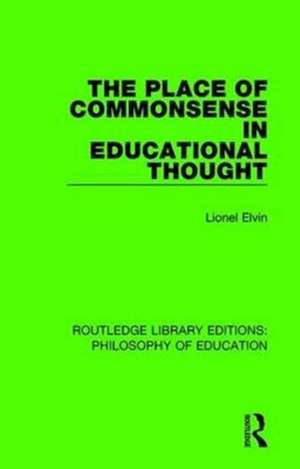The Place of Commonsense in Educational Thought: Routledge Library Editions: Philosophy of Education
Autor Lionel Elvinen Limba Engleză Hardback – 7 sep 2016
| Toate formatele și edițiile | Preț | Express |
|---|---|---|
| Paperback (1) | 333.32 lei 6-8 săpt. | |
| Taylor & Francis – 27 feb 2018 | 333.32 lei 6-8 săpt. | |
| Hardback (1) | 680.73 lei 6-8 săpt. | |
| Taylor & Francis – 7 sep 2016 | 680.73 lei 6-8 săpt. |
Din seria Routledge Library Editions: Philosophy of Education
-
 Preț: 359.44 lei
Preț: 359.44 lei - 34%
 Preț: 7528.09 lei
Preț: 7528.09 lei -
 Preț: 331.39 lei
Preț: 331.39 lei -
 Preț: 358.48 lei
Preț: 358.48 lei -
 Preț: 154.55 lei
Preț: 154.55 lei -
 Preț: 235.73 lei
Preț: 235.73 lei -
 Preț: 336.16 lei
Preț: 336.16 lei -
 Preț: 395.93 lei
Preț: 395.93 lei -
 Preț: 172.32 lei
Preț: 172.32 lei -
 Preț: 224.53 lei
Preț: 224.53 lei - 34%
 Preț: 677.86 lei
Preț: 677.86 lei -
 Preț: 306.51 lei
Preț: 306.51 lei -
 Preț: 221.70 lei
Preț: 221.70 lei -
 Preț: 338.99 lei
Preț: 338.99 lei -
 Preț: 333.32 lei
Preț: 333.32 lei -
 Preț: 220.78 lei
Preț: 220.78 lei -
 Preț: 293.98 lei
Preț: 293.98 lei -
 Preț: 359.44 lei
Preț: 359.44 lei -
 Preț: 295.07 lei
Preț: 295.07 lei -
 Preț: 231.16 lei
Preț: 231.16 lei -
 Preț: 295.07 lei
Preț: 295.07 lei -
 Preț: 336.16 lei
Preț: 336.16 lei -
 Preț: 214.01 lei
Preț: 214.01 lei
Preț: 680.73 lei
Preț vechi: 1027.40 lei
-34% Nou
Puncte Express: 1021
Preț estimativ în valută:
130.34€ • 135.72$ • 108.14£
130.34€ • 135.72$ • 108.14£
Carte tipărită la comandă
Livrare economică 14-28 februarie
Preluare comenzi: 021 569.72.76
Specificații
ISBN-13: 9781138694361
ISBN-10: 1138694363
Pagini: 162
Dimensiuni: 138 x 216 x 17 mm
Greutate: 0.45 kg
Ediția:1
Editura: Taylor & Francis
Colecția Routledge
Seria Routledge Library Editions: Philosophy of Education
Locul publicării:Oxford, United Kingdom
ISBN-10: 1138694363
Pagini: 162
Dimensiuni: 138 x 216 x 17 mm
Greutate: 0.45 kg
Ediția:1
Editura: Taylor & Francis
Colecția Routledge
Seria Routledge Library Editions: Philosophy of Education
Locul publicării:Oxford, United Kingdom
Cuprins
Foreword; Part 1: Commonsense and the Curriculum; 1. Curriculum Theory and Curriculum Reform 2. A Particular Case: The Classics and the Ancient World 3. Liberal Education Reconsidered 4. A Controversial Question: Compulsory Religion in the Public School System; Part 2: Commonsense and Concepts; 5. Facts, Beliefs and Values 6. Can We Work Together If Our Beliefs Differ? 7. The Concept of Rights in Education 8. The Concept of Equality in Education 9. Three Ways of Thinking About Education 10. The Concept of Research in Education; Notes and References; Index
Descriere
Throughout the course of his career Lionel Elvin has worked closely with experts in many different areas of the educational field and has found that in coming to conclusions about either theory or practical policy, commonsense is indispensable. The author explores the idea of commonsense in education in this study, first published in 1977, and examines this theme both in general and particular terms of the concepts people invoke in educational discussion. This title will be of interest to students of the philosophy of education.
